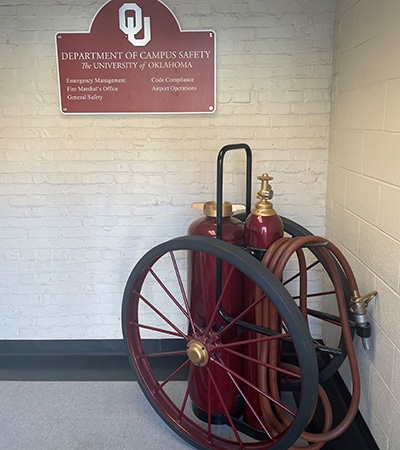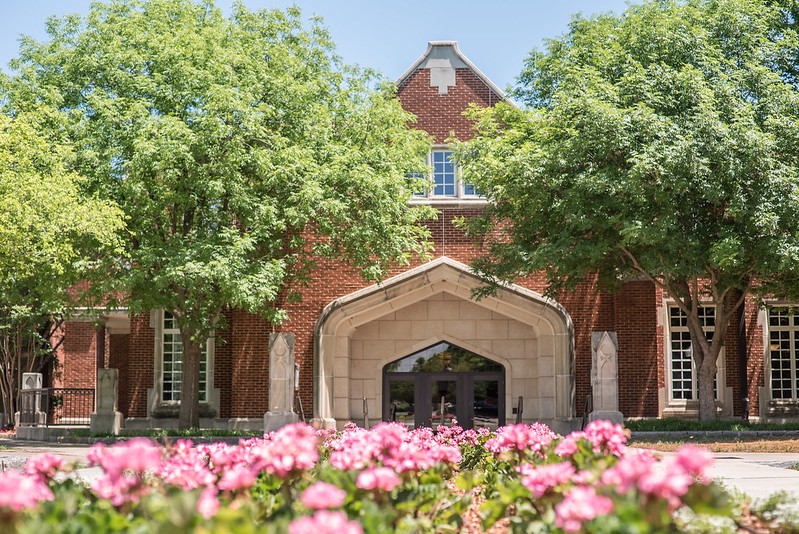
The University is committed to ensuring the health, safety, and welfare of persons and the protection of property on the OU campus in the event of an emergency or incident. The Emergency Operations Plan (EOP) is the official policy of the University of Oklahoma, Norman campus. The EOP has been developed as an operational guide for reacting to major emergencies and disasters that may have the potential to cause significant disruption to the normal campus operations.
The EOP complies with the National Incident Management System (NIMS) as required by the Federal Emergency Management Agency (FEMA). NIMS provides a nationwide framework enabling federal, state, local, and tribal governments, and the private sector non-governmental organizations to work together effectively and efficiently to prevent, prepare for, respond to, and recover from incidents regardless of cause, size or complexity. The use of NIMS at OU facilitates the institution's ability to communicate and coordinate response actions with other jurisdictions and external emergency response agencies.
The EOP incorporates current institutional plans and consists of four parts: the Base Plan, Functional Annexes, Threat/Hazard-Specific Annexes, and Attachments.
The Base Plan provides an overview of the approach to operations before, during, and after an emergency. The section also addresses the overarching activities to be undertaken regardless of the function, threat, or hazard. The content in this section provides a solid foundation for campus emergency operations.
Functional Annexes focus on critical operational functions and the courses of action developed to carry them out.
Threat/Hazard-Specific Annexes describe the courses of action unique to particular threats and hazards, these are developed based on the prioritized list of hazards determined in the risk assessment process.
The EOP recognizes the need for ongoing emergency management planning.
Due to the sensitivity of certain information contained within the EOP, it is not available for public viewing.
Use the Events Emergency Response Plan to create a plan for events held on campus. Contact The OU Department of Campus Safety (DCS) for assistance with the creation of plans, if needed. The Event Response Plan should be submitted for approval to DCS at least two weeks before your scheduled event. All campus events MUST have an Event Emergency Response Plan on file. For questions about the Event Emergency Response Plan, please email fire@ou.edu.
Should you discover SMOKE or FIRE or hear the fire alarm:
IMMEDIATELY LEAVE BUILDING BY MEANS OF NEAREST AVAILABLE EXIT

Collectively, the staff of Campus Safety located this antique fire extinguisher cart on a farm, went to retrieve it, and had it restored for display. The fire extinguisher cart is currently displayed in the downstairs entry way of the Department of Campus Safety office.
The University of Oklahoma prohibits unauthorized operation of unmanned aircraft systems (UAS, commonly known as drones) on university property. Non-Researchers including students, faculty, staff, and third-parties who will be conducting commercial flights for the purposes of promoting the University of Oklahoma, operating as a part of an authorized educational curriculum pursuit, or assessing property damage may apply for authorization to operate UAS through the Department of Campus Safety.
The UAS Review Committee will review applications for proposed UAS operations over campus that further the University of Oklahoma's mission and will approve or deny the request according to guidelines previously set forth. The UAS Review Committee will periodically review application guidelines to reduce the safety risks to people and reduce property damage.
This policy applies to all Non-Research based UAS flights over campus property for University related business. Any UAS flights that will be operated for research purposes must apply through the Office of the Vice President for Research (VPR).
UAS Review Committee and Guidlines (PDF)
For research based flights: (ou.edu/research-norman/research-services/research-related-policies/operating-unmanned-aerial-systems). Limited use of UAS for University-related business other than research may be authorized by the University’s UAS Review Committee.
For more information on evacuation plans, contact fire@ou.edu or Accessibility and Disability Resource Center
Automated external defibrillators (AEDs) can be life saving devices for persons suffering from sudden cardiac arrest. (SCA). The University of Oklahoma recognizes having AEDs on campus serve to enhance life safety by enabling users to administer defibrillation in an SCA emergency, if possible, prior to the arrival of emergency responders.
University buildings and departments in pursuit of AEDs, or in possession of, shall meet the requirements as set forth in this policy by the DCS serving as the approving authority for petitions by departments requesting to purchase AEDs, and facilitating inquiries and rendering decisions in regards to the University's AED policy.
The Director serves as the designee for all trespass appeals and is responsible for gathering information and statements in order to review and consider before rendering a final determination.
Any person who has been trespassed is entitled to an appeal. This appeal must be made in writing and submitted within ten (10) business days from the date the trespass was issued. Written appeals shall be submitted to:
Kevin Leach
Director of the Department of Campus Safety
160-B Felgar Street, Stuite 200
Norman, OK 73019-6041
or emailed to: kleach@ou.edu
Unscheduled walk-ins are not permitted.
Once a written appeal is received, the Director has up to fifteen (15) business days to review the appeal, including any relevant documents and statements, before making a ruling. The Director shall submit the decision to the petitioning party in writing to their identified physical or email address. Other means to contact the petitioning party may be utilized in the absence of a physical or email address when necessary. Any decisions rendered are final without further right to appeal. A "Denied" appeal means the petitioning party is not allowed on campus for six (6) months from the date the trespass was issued.
Lithium-ion batteries in electric personal vehicles can pose a fire risk, particularly during charging or due to damage. These fires can escalate rapidly, posing a significant danger to individuals and property. For this reason, all electric personal vehicles with lithium-ion batteries, including but not limited to, electric scooters, electric bikes, hoverboards and electric skateboards, may not be charged or stored inside university buildings.
